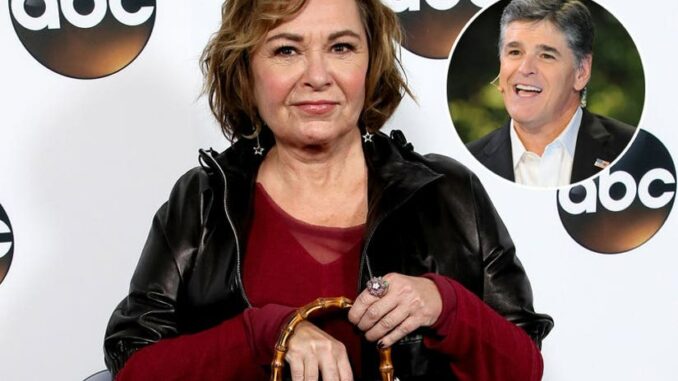
The announcement that Roseanne Barr would appear in an exclusive interview on Fox News with Sean Hannity marked a highly anticipated return to television following her 2018 firing from her ABC sitcom. Barr’s career took a major hit after her offensive tweet about former White House advisor Valerie Jarrett, which led to the cancellation of Roseanne after a successful revival season. In this interview, Barr would face questions on her controversial comments, the fallout from her tweet, and her views on the media’s treatment of her, while also reflecting on her impact on television. This segment on Hannity was a critical moment for Barr as she sought to explain her actions and reestablish her place in a rapidly changing entertainment landscape.
The Fallout from the Tweet

The controversy began when Barr tweeted a comparison of Jarrett, who served as a senior advisor to former President Obama, to an ape—a remark widely interpreted as racist. The backlash was swift and severe. Within hours, ABC made the decision to cancel Roseanne, a choice that ignited both praise and debate among fans and critics alike. Although Barr quickly issued an apology, the incident highlighted broader tensions within Hollywood and the public around race, politics, and the limits of comedy. It also underscored the increasing scrutiny on high-profile figures in an era when public and social media pressures influence corporate decisions.
Barr’s televised interview on Hannity offered her a platform to address the situation directly and defend her intentions. She argued that her comments were not meant to be racist but were misinterpreted. Barr also emphasized her frustration at repeatedly being labeled as “racist,” maintaining that she misunderstood Jarrett’s ethnic background. She has attempted to clarify this misunderstanding before, including a highly publicized outburst in a video on her YouTube channel where she claimed she thought Jarrett was white. Barr’s explanation sparked further debate and criticism, with some seeing it as a lack of accountability and others viewing it as a genuine, albeit clumsy, attempt to clarify her intent.
The YouTube Rant and Public Reactions
In one of her initial responses to the controversy, Barr released an explosive video where she passionately insisted, “I thought the b**** was white!” The video quickly went viral, generating a fresh wave of reactions and sparking discussion around her sincerity and stability. Media outlets and public commentators speculated about Barr’s state of mind, with some describing her as “unraveling.” The reaction to her self-produced video was mixed, reflecting how Barr’s brash humor and outspoken personality continued to polarize audiences.
As part of her interview on Hannity, Barr expanded on her frustrations with the media’s portrayal of her as a racist, describing the intense backlash as a concerted attempt to discredit her. She argued that the media had been overly critical of her show’s political themes, which centered around characters with diverse and conflicting beliefs who ultimately sought harmony. This theme of unity, she claimed, was unpopular with those in power because it showed a nuanced perspective on political and racial issues.
Conspiracy Theories and Hollywood’s Agenda

In her Hannity interview, Barr delved into her belief that the media and Hollywood elite had deliberately targeted her show for cancellation. She suggested that her show’s emphasis on bridging political divides made it a target for those who, according to Barr, preferred to highlight division rather than unity. Barr posited that Roseanne presented a unique perspective in its portrayal of a family with varying political beliefs that coexisted peacefully, showing that individuals with opposing views could still find common ground. She explained, “I predicted the outcome that they would take down the only show on television that showed a Trump hater and a Hillary hater making peace.”
According to Barr, the portrayal of a politically diverse family was a central reason behind her show’s popularity, and she believed that Hollywood was uncomfortable with this representation. She argued that current entertainment culture is reluctant to present a balanced view of American society and its political landscape. Her theory drew attention to the broader conversation around the politicization of television and how network decisions reflect wider cultural and ideological trends. This perspective, whether seen as credible or not, underscored Barr’s disillusionment with the entertainment industry, which she felt no longer supported the free exchange of ideas.
A Legacy of Defiance and Innovation in Television
Despite the backlash and the eventual cancellation of Roseanne, Barr’s impact on television remains significant. The show, which first premiered in the 1980s, was groundbreaking for its portrayal of a working-class American family navigating financial and social challenges. With its return in 2018, the reboot brought in record ratings and demonstrated that there was still an appetite for shows that reflected middle-America in a candid, unpolished manner. Barr argued that the show’s success was evidence of its importance to American audiences and expressed pride in having provided “peace in the home” for viewers.
Barr’s interview on Hannity attempted to refocus the public’s attention on the cultural impact of Roseanne rather than on her controversial tweets. She highlighted her conviction that audiences related to the Conner family’s struggles and that her portrayal of their lives had brought a valuable representation of blue-collar America to mainstream television. Through her work, Barr claimed she “gave the American people what they wanted,” demonstrating her belief that the core values of family unity and resilience resonated strongly with viewers.
Moving Forward: Redemption and Reflection
For Barr, the Hannity interview was not only an opportunity to defend her past actions but also to re-establish herself in the entertainment industry. She acknowledged that some of her responses may have been ill-advised but expressed a desire to move forward. Whether her appearance marked the beginning of a successful comeback or simply a chapter in her controversial public persona, it reinforced her unique place in the television landscape.

With this appearance on Fox News, Barr made a statement about her resilience and determination to continue engaging with her audience despite the challenges. While her career may never fully recover from the fallout of the 2018 incident, Barr’s journey reflects the complexities of navigating fame in the digital age, where social media blunders can have career-ending consequences. In an entertainment industry that is increasingly shaped by public perception and corporate response, Barr’s story serves as a reminder of the risks that come with high-profile platforms—and of the powerful role that television and media play in shaping public opinion.
Her journey following Roseanne’s cancellation highlights the difficulties of redemption in the public eye. For some fans, Barr’s explanations on Hannity offered insight and a sense of closure, while others remained skeptical of her motives and sincerity. Ultimately, her story underscores the challenges of maintaining both authenticity and accountability in a rapidly evolving media landscape.
